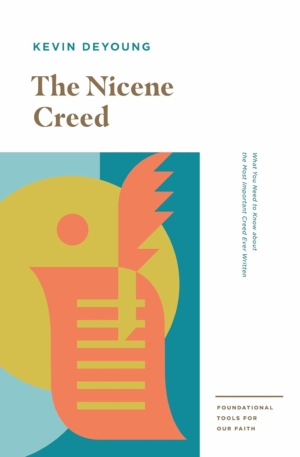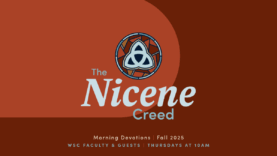This year, the Nicene Creed is 1700 years old, and here we are still paying attention to it. By any measure, that is an impressive achievement. The number of historical and cultural artifacts to which we still pay attention and which we . . . Continue reading →
Ecumenical Creeds
Review: The Nicene Creed: Why You Need To Know About The Most Important Creed Ever Written By Kevin DeYoung
This year, 2025, marks the 1700th anniversary of the Nicene Creed, which is the whole Christian church’s most foundational statement about the Trinity. Protestants (of the sound varieties), Roman Catholics, and the Eastern Orthodox all share agreement that the doctrines coming from . . . Continue reading →
Video: The Nicene Creed
Dr. Clark commences the WSC Fall Faculty Series on the Nicene Creed. Continue reading →
Round Up Of New Commentaries On The Nicene Creed
First, I am happy to recommend Crossway’s recent release of Kevin DeYoung’s The Nicene Creed: What You Need to Know about the Most Important Creed Ever Written. It is succinct and can be read quickly. Typical of KDY, he is mainstream, wonderfully averse . . . Continue reading →
The Cradle Of Christian Truth: Apostles’ Creed (Part 19)—Life Everlasting. Amen
When I was in college, I worked in a warehouse that refurbished science kits for elementary and middle schools. As part of my job, I had to replace used-up supplies for various experiments, like the used-up tape, staples, or flour. One summer, . . . Continue reading →
The Cradle Of Christian Truth: Apostles’ Creed (Part 18)—The Resurrection of the Body
In one elementary school science lesson, we were given bug eggs that we were supposed to help get through the various life-cycle stages. However successful I was at that endeavor with those particular bugs, the principle is something I think we all . . . Continue reading →
The Cradle Of Christian Truth: Apostles’ Creed (Part 17)—The Forgiveness of Sins
When I was a kid, my grandfather would often talk about his hypothetical outline for what he would do if he won millions of dollars. He intended to pay off his own debts and the debts and expenses of all his children . . . Continue reading →
The Cradle Of Christian Truth: Apostles’ Creed (Part 16)—The Communion of the Saints
The phrase often goes around that “blood is thicker than water.” One of the ways people use this phrase is to mean that family relationships are more important than relationships made by baptism. In other words, when a family member does something . . . Continue reading →
The Cradle Of Christian Truth: Apostles’ Creed (Part 15)—The Holy Catholic Church
When I lived in the UK, I had to go on one occasion to the US embassy in London. As I entered the embassy, I was struck by how different the atmosphere of the whole place was. A list of things stood . . . Continue reading →
The Cradle Of Christian Truth: Apostles’ Creed (Part 14)—I Believe in the Holy Spirit
I lived in New Zealand for a few months during college for a mission trip. We went to help a church start outreach efforts on the nearby university campus. One day, we attended an event where various organizations set up tables to . . . Continue reading →
The Cradle Of Christian Truth: Apostles’ Creed (Part 13)—From there he will come to judge the living and the dead
Casablanca is one of the most famous movies in cinematic history, leaving us with more than its fair share of artifacts ingrained in cultural memory even eighty years later. Humphrey Bogart alone left us with a stack of lines most of us . . . Continue reading →
The Cradle Of Christian Truth: Apostles’ Creed (Part 12)—He Ascended into Heaven and is Seated at the Right Hand of God the Father Almighty
It is a common bug of humanity that we do not like saying goodbye. We even have stock phrases like, “I’m bad at goodbyes,” or, “Let’s say ‘see you later’ rather than ‘goodbye.’” Even “Absence makes the heart grow fonder,” as true . . . Continue reading →
The Cradle Of Christian Truth: Apostles’ Creed (Part 11)—The third day he rose again from the dead
The Trojan Horse is the classic example of a bait and switch. Legend says that, for ten years, the Greeks waged war on the city of Troy. This war went so long because Troy was so well fortified. One morning, the Trojans . . . Continue reading →
Why Does The Council Of Chalcedon Matter?
Dr. R. Scott Clark explains why the Council of Chalcedon matters for our theology today. Continue reading →
The Cradle Of Christian Truth: Apostles’ Creed (Part 10)—He Descended into Hell
If I were speaking to an audience and asked them what the word reed means, from the sound of the word, the majority response would likely be something like “processing written words.” When I explain that the word in my notes is . . . Continue reading →
The Cradle Of Christian Truth: Apostles’ Creed (Part 9)—Suffered under Pontius Pilate, Crucified, Died, and Was Buried
One of the common questions that Christians face in conversations with unbelievers is, “How could a loving God send anyone to hell?” Although we certainly have to keep a clear focus on God’s love and how his mercy is truly available to . . . Continue reading →
The Cradle Of Christian Truth: Apostles’ Creed (Part 8)—Conceived by the Holy Spirit, Born of the Virgin Mary
One of the flavors of the day in movies and television seems to be the reboot. You take an old story and retell it in a new way. Or you take an old character and reset the storyline, setting aside the previous . . . Continue reading →
The Cradle Of Christian Truth: Apostles’ Creed (Part 7)—His only begotten Son, our Lord
The American posture is dominated by pragmatism—meaning that our biggest question for whether or not we should learn something is, “Does it work?” We need ideas to do something for us to think they are at all worthy of our attention. A . . . Continue reading →
The Cradle Of Christian Truth: Apostles’ Creed (Part 6)—I Believe In Jesus Christ
“What’s in a name?” A rose by any other name would smell as sweet. So, we might easily assume that what we name something is unimportant. And yet, there seems to be some sort of natural affinity in most ears for the . . . Continue reading →
The Cradle Of Christian Truth: Apostles’ Creed (Part 5)—Maker Of Heaven And Earth
An old joke pokes at the irony of rejecting God by describing an atheistic scientist talking to God about why we supposedly no longer need him. He says to God, “You know, it used to be that we needed you to help . . . Continue reading →



